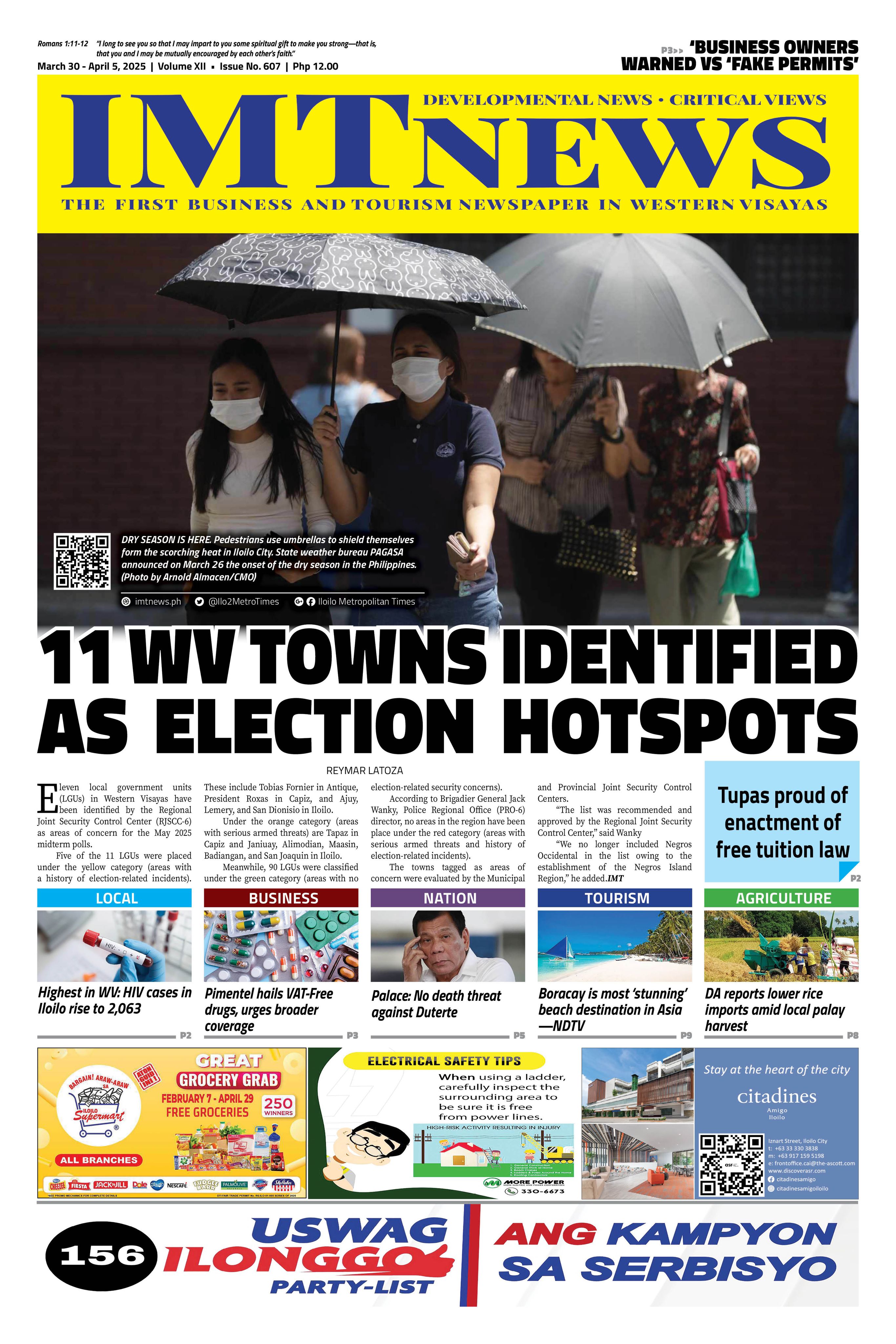The Department of Agriculture (DA) Western Visayas presented its programs and strategies to help local farmers in managing problems in the agri sector through an information caravan held on March 11 in Lemery, Iloilo.
Ernie Rosendo Villanueva, the DA Agricultural Program Coordinating Officer for Iloilo, said that the farmers themselves should cooperate and help the government in curbing the threats in the industry. These include the African Swine Fever (ASF), Fall Armyworm (FAW), and the effects of the Rice Tariffication Law (RTL).
“You have to be observant. If you find any possible ASF or FAW incidents in your area, coordinate immediately to the Municipal Agriculture Office,” he added.
Some 180 farmers had gathered and learned about the different programs and services of the agency that will help them become prepared, resilient and competitive despite the said threats.
Regional Information Officer James Earl Ogatis emphasized that for the farmers to avail of the DA programs they have to enlist their names in the Registry System for Basic Sectors in Agriculture (RSBSA).
As stated in the RTL, the P10 billion to be generated annually for the next six years shall be used as Rice Competitiveness Enhancement Fund (RCEF).
The rice fund shall be allocated into four different components, to wit: P5 billion for the mechanization program; P3 billion for seeds development, propagation and distribution; P1 billion for credit; and P1 billion for extension services.
According to Chelly Ann Nojas of the Philippine Rice Research Institute (PhilRice), they are now set to distribute 359,756 bags of certified inbred seeds to 179,189 farmers for the wet cropping season.
During the distribution, PhilRice also holds a technical briefing to the recipients. A farmer can receive seeds good for not more than 3 hectares of rice area.
“The seed component program of RCEF intends to increase at least one metric ton per hectare average yield of farmers. PhilRice also encouraged farmers to adopt a roll-over system for the seed capital build-up,” she added.
Meanwhile, Engr. JanJan Bidon of the Philippine Center for Postharvest Development and Mechanization (PhilMech) tackled the procedures and requirements for the accredited Farmers Cooperatives and Associations (FCAs) to benefit from the mechanization support.
The program seeks to promote the use of efficient and cost-reducing mechanization interventions from the government.
A total of 123 FCAs in the region were validated as eligible recipients of various kinds of farm machinery and equipment.
“Fortunately, Lemery is among the 38 towns here in the province that will have P5 million allocation for RCEF mechanization program every year for the next years,” he said.
On the other hand, Rodel Leyson of the Agricultural Training Institute said that they are partnering with the Technical Education and Skills Development Authority, PhilRice and PhilMech in enhancing beneficiaries’ capability on modernized inbred rice seed production and other relevant skills for improved competitiveness and income of farmers.
Under RCEF, rice farmers can also access financing from Land Bank of the Philippines (LBP) and the Development Bank of the Philippines (DBP).
Individual borrowers can avail of the loan with a two percent interest rate per annum.
For the Province of Iloilo, DBP as the assigned financing institution will soon release the approved P100 million loan for rice farmers.
Inocentes Ypanto Jr., LBP Iloilo Dept. Manager also explained the Agricultural Competitiveness Enhancement Fund (ACEF) Loan Program which can be availed by farmers who grow rice and other crops.
He added that individual farmers could borrow up to P1 million, and farmers association/coop could avail up to P5 million per project.
These programs gear towards making every Filipino rice farmer competitive as the rice importation has already been liberalized.
Moreover, the DA also underscored the roles of the farmers in the prevention and management of Fall Armyworm.
The pest mainly affects corn plant, and there were already confirmed pest infestations in some parts of the region.
Farmers were urged to report pest incidence to the Regional Crop Protection Center (RCPC) at WESVIARC, Hamungaya, Jaro.
RCPC continuously monitors and validates areas regionwide with incident reports on FAW. Center chief Ryan Rasgo together with regional info officer Ogatis has an ongoing info campaign in the “Kadalag-an Sang Agrikultura” radio program of DA.
The same efforts are being done to stop the entry of the deadly swine disease in the region.
Recently, Regional Executive Director Remelyn Recoter said that Western Visayas remains a free zone from ASF. She had emphasized that traders and the public must abide by the executive orders on the temporary ban of pork and pork products from all ASF-contaminated areas.
Strict quarantine, surveillance and monitoring activities are now being carried out by DA, Bureau of Animal Industry, local government units in cooperation with the other members of the Inter-Agency Task Force to spare the region from ASF outbreak.
Moreover, DA technical staff from the High Value Crops Development Program, Corn Program, and the Agribusiness and Marketing Assistance Division also discussed their programs and services to the farmers.
Lemery municipal mayor Oscar C. Villegas Jr. lauded DA’s efforts in keeping the farmers well-informed of the government’s actions and strategies to better the sector.
He stressed that farmers should treat their livelihood as a business to be competitive.
IEC materials, assorted vegetable seeds, and fruit tree seedlings were also distributed to the farmers who attended the one-day caravan. /MHToreno/DA-RAFIS 6








